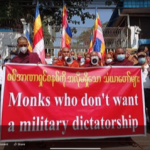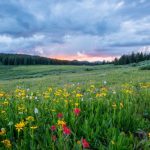Thursday
Buddhism, Psychedelic-Assisted Therapy and the Spiritual Path: An Interview with Dr. Sara Lewis
by Jillian Johnson
Register for the Buddhism, Psychedelic-Assisted Therapy and the Spiritual Path One-Day Retreat
One of the five main precepts in Buddhism is to avoid intoxicants, and it is clear that the use of substances can lead to spiritual bypassing. Yet many renowned practitioners in the West have talked openly about psychedelics as a catalyst to spiritual awakening that led them to the Dharma. Today, we sit down with Dr. Sara Lewis, co-founder of the Memoru Center for Visionary Healing Arts in Boulder, Colorado, and the Center for Psychedelic Studies at Naropa University, where she also served as an associate professor, and author of Spacious Minds: Trauma and Resilience in Tibetan Buddhism, to discuss the use of psychedelics in therapy and along one’s spiritual journey. In this interview, Sara provides us with her personal and professional perspective while considering how such practices may intersect, or not, with the Buddhist path.
Dr. Sara Lewis will hold an online mini-retreat, Buddhism, Psychedelic-Assisted Therapy and the Spiritual Path, through Shambhala Online on July 20, 2025. Click here to learn more and to register.
Jillian: Hi Dr. Lewis, thank you so much for being here with us today to share more about your work and knowledge in the field of psychotherapy and the implementation of psychedelics in mental health settings and spiritual pursuits.
Would you please tell us a little bit about your ‘why’ behind your work in mental health and how it expanded into the area of psychedelic-assisted therapy?
Dr. Lewis: I have long been interested in the mind: concepts of mind, the beauty and the challenges of the mind, and what it means to be human. As an anthropologist of religion and a psychotherapist, I am also deeply interested in how our connection to the divine changes across culture. In one way or another, I have been involved in the field of psychedelic studies for the last twenty years, yet it is more recent that psychedelic therapy has become more mainstream. As a Buddhist, I continue to see my clinical work as a skillful means to work with suffering in the world.
Jillian: How fascinating. We heard you opened a new clinic? Congratulations and please tell us more!
Dr. Lewis: Yes! Memoru Center for Visionary Healing Arts is a contemplative-based psychedelic training institute and community clinic where we offer legal psychedelic therapy. We can accept out of state clients who wish to travel to Colorado for a psilocybin experience. The Memoru clinic has a strong connection to Naropa University, where most of the cofounders have either worked as faculty or completed their studies.
Jillian: That’s very exciting, congratulations again! Speaking of legal psychedelic therapy, what do you feel are the current social and political climates surrounding the utilization of substances (primarily psilocybin and MDMA) in controlled mental health and spiritual settings? Are you noticing more or less acceptance in your typical day-to-day professional and personal interactions than in recent years?
Dr. Lewis: In general, there is a lot of interest and excitement for the therapeutic use of psychedelics. Many people understand that among veterans, abuse survivors, and others with PTSD, our standard treatments often fall short. As well, there is deep potential for plant medicines and psychedelics for those navigating the end of life. At Memoru, we will have a family program that aims to work with entire families–this might be when one person is at the end-of-life, navigating the post-partum period after birth, couples work, or a veteran returning home. When psychedelic care is done in a way that is slow, intentional and safe, I think there is significant support. At the same time, our basic health care infrastructure is not really set up to easily make this type of work accessible. Psychedelics do not fit easily into a capitalist system and without sounding too conspiratorial, the global Big Pharma system has many reasons to hinder the kind of paradigm shift many of us interested in psychedelic-assisted therapy are hoping for. Still, I believe that most of us yearn for change. With psilocybin now legal in various capacities in Oregon, Colorado and most recently, New Mexico, I believe in the next 5-10 years we will see a significant shift in accessibility of these modalities in North America and around the globe.
Jillian: Thank you so much for this thoughtful response, Sara. It is comforting to know that all areas of support are being explored for those seeking treatment and their families. Do you feel momentum and public support will eventually result in the integration of psychedelics into mainstream healthcare?
Dr. Lewis: Absolutely. And this could go the other direction as well if we do not take seriously the ethical responsibility to work with these medicines in a safe way. Many cultures across the world understand plant medicines to be living beings with sentience. They shouldn’t be “taken” in an extractive way. If we can relate with the cultures ethically who are stewards of these medicines, and collaborate and learn from them, I think we may have good results. For society as a whole to open up to them, I think we are in a critical period of needing to demonstrate that as a human society we can be trusted with these powerful agents. It’s up to us! But I feel the plants and fungi also want to help.
Jillian: I love your statement “…I feel the pants and fungi also want to help” and the care you show towards our Plantae and Fungi kingdoms. Have you noticed an increase in the number of patients and clients willing to consider psychedelics as part of their treatment plan for depression, anxiety, addiction, PTSD, etc.?
Dr. Lewis: Yes, very much so. Many people have earnestly tried conventional therapies without much relief. There are also many people seeking to work with suffering within the human condition in a way that honors and deepens their spiritual path. So there’s sort of a question about whether the work is “mental health work,” “spiritual work,” or something else. There is also a lot of joy, beauty and connection, something that may not be fully honored in a traditional treatment plan that tends to focus rather narrowly on the eradication of symptoms.
Jillian: It sounds like a very integrative approach that is catered to each individual’s unique needs and requirements, which is still lacking in many areas of healthcare. Would you tell us more about a situation(s) where the assistance of psychedelics, in a therapeutic application, aided a client in a breakthrough (mental, emotional and/or spiritual) that may not have occurred, or may have taken longer to occur, with more traditional mental health practices? Are you able to expand on the experience, at least from your perspective, and how that felt?
Dr. Lewis: I have had so many clients with intergenerational and ancestral experiences, even when they weren’t necessarily seeking that out. This has looked like deeply experiencing and seeing the ways that an ancestral burden has been passed down through the ages, visitations from elders who have passed, and sometimes a deep experience of connection and homecoming into one’s ancestral lineage. This happens so frequently that I myself, have embarked on a formal process of Ancestral Lineage Healing over the past year to better learn to work with my own spiritual lines. We will have more on this in the mini-retreat!
Jillian: This sounds not only incredibly interesting, but heart-warming as well. What a beautiful experience for both you and your clients. I am intrigued to hear more at the mini-retreat! In which situation(s) do you recommend someone not take psychedelics or partake in psychedelic-assisted therapy if it is a path they are interested in pursuing for their mental health and/or spiritual journey?
Dr. Lewis: These agents can be very powerful and it’s important to know if it’s the right time. I receive many referrals for people who have had negative even traumatic experiences resulting from psychedelics. Beyond contraindicated conditions like psychosis and mania (though even those who have these histories may be able to work in psychedelics under certain conditions), I wouldn’t recommend jumping into working with them if things aren’t stable enough to be able to accommodate potentially big and sometimes disruptive shifts. Sometimes these medicines work through disruption and dissolving: this could be to harmful patterns, misperceptions, ego-clinging, itself, or even the dissolving of relationships, career or other major disruptions.
Jillian: This is a very strong point to consider. Thank you for mentioning ‘being ready’ for shifts. While it is often said “The only constant change,” it is important to remember to be as grounded as possible before inviting a powerful catalyst for said change. What would you recommend as some of the “should” and “should nots” before holding a psychedelic session in terms of choosing an appropriate environment, monitoring one’s current mental state, integrating other practitioners and/or professionals, etc.? In a sense, what would you recommend in terms of setting yourself up for an enlightening experience?
Dr. Lewis: Most people do not need to work with a psychedelic therapist or clinician to have a safe and meaningful experience. This was recognized in the state of Colorado that has approved personal use of psilocybin mushrooms for anyone 21 years and over. Colorado also allows for individuals to embark on training as facilitators who do not hold a clinical license, again recognizing that many people can be trained to hold space for someone else ethically and with care. However, if the intention is really to engage in therapeutic work, it would be important to seek out a trained and licensed clinician. Sometimes it can be hard to really discern whether the work is “therapeutic” or whether it is “spiritual.” But this isn’t a new problem. Many cultures around the world do not separate the paths of healing and spirituality. What is most important is to feel that the setting and the practitioner is slow, intentional, and rooted in some kind of practice lineage. I would not get involved with anyone who doesn’t seem to have any mentors, elders, or community of accountability.
Jillian: Very true, consistent and quality integrative care that takes into account physical, mental, spiritual, and emotional health of an individual is a hurdle that seems to continually appear, at least in American culture. On a more casual note, if you were talking freely (perhaps in a bar) to a captivated audience, what would your elevator pitch be when introducing a metaphysical discussion on the topic of psychedelics in therapy or on one’s spiritual journey?
Dr. Lewis: I probably wouldn’t make one. A person really needs to feel the call, so to speak, on their own! If you listen and hear the call, however, many of us all across the globe would love nothing more than to dive into that conversation!
Jillian: What a conscientious approach. Wait for the invitation. And now for our final interview question, what has the use of psychedelics done for your personal spiritual growth? Do you have any stories you’re willing to share with us?
Dr. Lewis: Yes, but I will save these for the mini-retreat. Hope you can join!
Thank you, Sara, we’re looking forward to it! Myself and Shambhala Online thank you for taking the time to answer our questions about these exciting advances in patient/client care. You have touched on many dynamic aspects regarding the use of psychedelics in client care and we are eager to dive deeper on July 20!
Dr. Sara Lewis is Co-founder of Memoru Center for Visionary Healing Arts, a psychedelic clinic and training institute in Boulder, Colorado. She served as Associate Professor at Naropa University in Buddhist-Informed Counseling, where she also co-founded the Center for Psychedelic Studies. Sara is author of Spacious Minds: Trauma and Resilience in Tibetan Buddhism, an ethnographic study of mind, memory and recovery from collective trauma in the Tibetan exile community. She teaches in Shambhala on the topic of Buddhism and psychedelics, and has also served in a number of leadership roles, including a term on the Interim Shambhala Board.
Entries filed under Community Articles
Touching the Earth: July Newsletter – HIGHLIGHT
Finding Our Way Through Existential Crisis: The Centre for Local Prosperity By Robert Cervelli “We don’t own the land, the land owns us.” These were the words spoken to me by a Mi’kmaw Indigenous Elder. We were talking about the colonial mindset and how dramatically juxtaposed it is ... continuePosted July 23, 2021 by Natasha West
Shambhala Buddhism And Fashion Choices – HIGHLIGHT
By “Jackie Writing Jackie” The basic teachings of Buddhism, which are a core component of Shambhala and other types of Buddhism, include The Three Universal Truths, The Four Noble Truths, and The Noble Eightfold Path. Buddhism, which is a philosophy of life, often takes these teachings into ... continuePosted June 22, 2021 by Rose_Keyes
Touching the Earth Collective: June Newsletter – HIGHLIGHT
Bill McKibben on Climate Action and How Faith Communities Are Helping This is a lightly edited transcript of Bill McKibben speaking on a GreenFaith Eco theology Zoom call, on May 17, 2021, in preparation for the Treaty People Gathering of June 5-8. First thing to say is that ... continuePosted June 15, 2021 by Rose_Keyes
A Tale of Impermanence – HIGHLIGHT
by Debra Dysart, Los Angeles Shambhala One thing the global pandemic taught us was that plans change. What you may have thought you’d be doing in 2020 likely didn’t happen. Last March, I remember being at a chorus rehearsal with 50 fellow singers preparing for a pair ... continuePosted May 19, 2021 by archives-staff
Touching the Earth Collective: May Newsletter – HIGHLIGHT
Mind Blindness By John Rockwell A while back, I read an article about “plant blindness.” When shown a picture that shows a pair of elephants in a clearing and asked what they see, virtually everyone says, “Two elephants.” Even when the question is repeated, “What do you see?” ... continuePosted May 7, 2021 by archives-staff
Introducing Shambhala Community Conversations – HIGHLIGHT
If there is an “it,” we are it. -Shambhala Community Conversations participant This year, a growing team of Shambhalians has hosted more than 30 Shambhala Community Conversations: group discussions on key topics in our community that are open and welcoming to all. More than 350 community members worldwide ... continuePosted April 29, 2021 by archives-staff
Make a Loud Noise for Democracy – HIGHLIGHT
Burmese Buddhist Monk Min Thu Nya, or “King Zero” is among the most outspoken pro-democracy activists in Myanmar. Since February 1, when an armed military coup overthrew Myanmar’s nascent democracy, King Zero’s real-time Facebook posts have roused the courage of all Myanmar people, urging them to ... continuePosted April 21, 2021 by archives-staff
Honoring Earth Day 2021 in Shambhala – HIGHLIGHT
Irene and Jocabed at UN COP25 By Irene Woodard In December 2020, who knew a year later we would be in the Covid Pandemic. I was attending the UN COP25 in Madrid representing GreenFaith, as chair of the the Board of Directors of this 28 year old interfaith environmental ... continuePosted April 20, 2021 by archives-staff
Touching the Earth Collective: April 2021 – HIGHLIGHT
April 2021 Newsletter Persisting on the Dark Mountain An interview with Nick Hunt and Charlotte Du Cann, by Greg Webster Back in the late 2000s two young writers, Paul Kingsnorth and Dougald Hine, emerging from environmental activism in the UK, were troubled by the direction of travel they saw ... continuePosted April 6, 2021 by archives-staff
Parinirvana Day 2021 – HIGHLIGHT
Events, Resources & Offerings The Parinirvana, or passing, of the Vidyadhara, Chögyam Trungpa, Rinpoche is commemorated on April 4 each year. It is a day for the Shambhala sangha to gather together to celebrate the life and teachings of the Vidyadhara. This year, Lady Diana Mukpo will host ... continuePosted March 25, 2021 by archives-staff
Some Ways to Use Music In Your Meditation – HIGHLIGHT
By “Jackie Writing Jackie” Meditation practice and music are naturally intertwined. The natural rhythm and tones of music can help you to channel your mind, regulate your breathing patterns and move your consciousness inwards, away from worries and troubles. Studies have shown that music helps you to focus and concentrate on ... continuePosted March 24, 2021 by archives-staff
Happy Birthday, Taggie Mukpo! – HIGHLIGHT
Taggie Mukpo with Rowan From the Tagtruk Mukpo Trust Taggie Mukpo celebrated his 50th Birthday today. The first son of Lady Diana Mukpo and Chögyam Trungpa Rinpoche, Tagtruk Mukpo celebrated his 50th Birthday at the country home of his Shared Living Provider (SLP) James Christie in Hardwick, Vermont, ... continuePosted March 9, 2021 by archives-staff
Touching the Earth Collective: March 2021 – HIGHLIGHT
March 2021 Newsletter “What Level of Threat Are We Facing Now?” Christoph Schönherr now works for The Climate Task Force in Europe, helps coordinate the global network Scientists 4 Future, and is on the working group on sustainability and climate change of the United Nations Association of Germany. Richard Reoch asked him about ... continuePosted March 5, 2021 by archives-staff
Carta del Torii Abierto
¡Alegre año del buey de metal para la sangha de guerreros! Diana Mukpo reunió a un grupo el verano pasado para que le aconsejara sobre la mejor manera de apoyar el legado dhármico de Chögyam Trungpa Rimpoché. Formamos parte de ese grupo plurigeneracional de profesores y practicantes ... continuePosted March 5, 2021 by archives-staff
Letter from the Open Torii – HIGHLIGHT
Note: This letter was originally posted at https://www.ldmletter.com/. Este artículo ha sido traducido al español aqui. Cheerful year of the Iron Ox to the Sangha of Warriors, Last summer, Diana Mukpo convened a group to advise her on how best to support the dharma legacy of Chögyam Trungpa ... continuePosted March 2, 2021 by archives-staff
![]() RSS feed for the Community Articles category
RSS feed for the Community Articles category
View all posts from authors in Community Articles: jillian_johnson
























